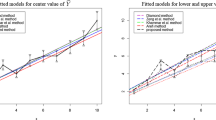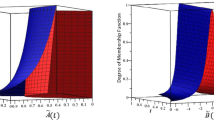Abstract
A new approach is investigated to the problem of quantile regression modeling based on the fuzzy response variable and the fuzzy parameters. In this approach, we first introduce a loss function between fuzzy numbers which it can present some quantiles of fuzzy data. Then, we fit a quantile regression model between the available data based on proposed loss function. To evaluate the goodness of fit of the optimal quantile fuzzy regression models, we introduce two indices. Inside, we study the application of the proposed approach in modeling some soil characteristics, based on a real data set.


Similar content being viewed by others
References
Akbari MG, Hesamian G (2018) Linear model with exact inputs and interval-valued fuzzy outputs. IEEE Trans Fuzzy Syst 26:518–530
Arefi M (2016) Clustering regression based on interval-valued fuzzy outputs and interval-valued fuzzy parameters. J Intell Fuzzy Syst 30:1339–1351
Arefi M, Taheri SM (2014) Weighted similarity measure on interval-valued fuzzy sets and its application to pattern recognition. Iran J Fuzzy Syst 11:67–79
Arefi M, Taheri SM (2015) Least squares regression based on Atanassov’s intuitionistic fuzzy inputs-outputs and Atanassov’s intuitionistic fuzzy parameters. IEEE Trans Fuzzy Syst 23:1142–1154
Buckley JJ (2005) Fuzzy statistics: regression and prediction. Soft Comput 9:769–775
Celmins A (1987) Least squares model fitting to fuzzy vector data. Fuzzy Sets Syst 22:260–269
Chachi J, Roozbeh M (2017) A fuzzy robust regression approach applied to bedload transport data. Commun Stat Simul Comput 46:1703–1714
Chachi J, Taheri SM (2011) A least-absolutes approach to multiple fuzzy regression. In: Proceedings of the 58th World Statistics Congress of the ISI (International Statistical Institute), Dublin (Ireland), CPS077-01
Chachi J, Taheri SM (2013) A least-absolutes regression model for imprecise response based on the generalized Hausdorff-metric. J Uncertain Syst 7:265–276
Chachi J, Taheri SM, Rezaei Pazhand H (2011) An interval-based approach to fuzzy regression for fuzzy input-output data. In: Proceedings of 2011 IEEE international conference on fuzzy systems, Taipei (Taiwan), pp 2859–2863
Chen LH, Hsueh CC (2009) Fuzzy regression models using the least-squares method based on the concept of distance. IEEE Trans Fuzzy Syst 17:1259–1272
Choi SH, Buckley JJ (2008) Fuzzy regression using least absolute deviation estimators. Soft Comput 12:257–263
Coppi R, D’Urso P, Giordani P, Santoro A (2006) Least squares estimation of a linear regression model with LR fuzzy response. Comput Stat Data Anal 51:267–287
D’Urso P, Massari R, Santoro A (2011) Robust fuzzy regression analysis. Inf Sci 181:4154–4174
Hasanpour H, Maleki HR, Yaghoubi MA (2010) Fuzzy linear regression model with crisp coefficients: a goal programing approach. Iran J Fuzzy Syst 7:19–39
Hasanpour H, Maleki HR, Yaghoubi MA (2011) A goal programming approach to fuzzy linear regression with fuzzy input-output data. Soft Comput 15:1569–1580
Hosseinzadeh E, Hassanpour H, Arefi M (2015) A weighted goal programming approach to fuzzy linear regression with crisp inputs and type-2 fuzzy outputs. Soft Comput 19:1143–1151
Hosseinzadeh E, Hassanpour H, Arefi M (2016a) A weighted goal programming approach to estimate the linear regression model in full quasi type-2 fuzzy environment. J Intell Fuzzy Syst 30:1319–1330
Hosseinzadeh E, Hassanpour H, Arefi M, Aman M (2016b) A weighted goal programming approach to fuzzy linear regression with quasi type-2 fuzzy input-output data. TWMS J Appl Eng Math 6:193–212
Kelkinnama M, Taheri SM (2012) Fuzzy least-absolutes regression using shape preserving operations. Inf Sci 214:105–120
Kim KJ, Kim DH, Choi SH (2005) Least absolute deviation estimator in fuzzy regression. J Appl Math Comput 18:649–656
Klir GJ, Yuan B (1995) Fuzzy sets and fuzzy logic theory and applications. Prentic-Hall, Englewood Cliffs
Koenker R (2005) Quantile regression. Cambridge University Press, New York
Kratschmer V (2006a) Strong consistency of least squares estimation in linear regression models with vague concepts. J Multivar Anal 97:633–654
Kratschmer V (2006b) Limit distributions of least squares estimators in linear regression models with vague concepts. J Multivar Anal 97:1044–1069
Kruse R, Meyer KD (1987) Statistics with vague data. Reidel Publishing Company, Dortrecht
Leski JM, Kotas M (2015) On robust fuzzy c-regression models. Fuzzy Sets Syst 279:112–129
Mashinchi MH, Orgun MA, Mashinchi M, Pedrycz W (2011) A Tabu-harmony search-based approach to fuzzy linear regression. IEEE Trans Fuzzy Syst 19:432–448
Mohammadi J, Taheri SM (2004) Pedomodels fitting with fuzzy least squares regression. Iran J Fuzzy Syst 1:45–61
Nasibov EN (2007) Fuzzy least squares regression model based of weighted distance between fuzzy numbers. Autom Control Comput Sci 41:10–17
Parvathi R, Malathi C, Akram M, Atanassov KT (2013) Intuitionistic fuzzy linear regression analysis. Fuzzy Optim Decis Mak 12:215–229
Pirzada UM, Vakaskar DC (2017) Existence of Hukuhara differentiability of fuzzy-valued functions. J Indian Math Soc 84:239–254
Poleshchuk O, Komarov E (2012) A fuzzy linear regression model for interval type-2 fuzzy sets. In: Conference of the North American fuzzy information processing society (NAFIPS), pp 1–5
Pourahmad S, Ayatollahi SMT, Taheri SM (2011) Fuzzy logistic regression: a new possibilistic model and its application in clinical vague status. Iran J Fuzzy Syst 8:1–17
Taheri SM, Kelkinnama M (2008) Fuzzy least absolutes regression. In: Proceedings of the fourth international IEEE conference on intelligent systems, Varna, Bulgaria, vol 11, pp 55–58
Taheri SM, Kelkinnama M (2012) Fuzzy linear regression based on least absolute deviations. Iran J Fuzzy Syst 9:121–140
Tanaka H, Vegima S, Asai K (1982) Linear regression analysis with fuzzy model. IEEE Trans Syst Man Cybern 12:903–907
Torkian F, Arefi M, Akbari MG (2014) Multivariate least squares regression using interval-valued fuzzy data and based on extended Yao-Wu signed distance. Int J Comput Intell Syst 7:172–185
Xu RN, Li CL (2001) Multidimensional least-squares fitting with a fuzzy model. Fuzzy Sets Syst 119:215–223
Yang MS, Ko CH (1997) On cluster-wise fuzzy regression analysis. IEEE Trans Syst Man Cybern Part B Cybern 27:1–13
Yang MS, Lin TS (2002) Fuzzy least-squares linear regression analysis for fuzzy input–output data. Fuzzy Sets Syst 126:389–399
Yang Z, Yin Y, Chen Y (2013) Robust fuzzy varying coefficient regression analysis with crisp inputs and Gaussian fuzzy output. J Comput Sci Eng 7:263–271
Zeng W, Feng Q, Li J (2017) Fuzzy least absolute linear regression. Appl Soft Comput 52:1009–1019
Zhang D, Lu Q (2016) Robust regression analysis with LR-type fuzzy input variables and fuzzy output variable. J Data Anal Inf Process 4:64–80
Zimmermann HJ (1996) Fuzzy sets theory and its applications, 3rd edn. Kluwer, Boston
Author information
Authors and Affiliations
Corresponding author
Ethics declarations
Conflict of interest
The author declares that there is no conflict of interest regarding the publication of this paper.
Ethical approval
This article does not contain any studies with human participants or animals.
Additional information
Communicated by A. Di Nola.
Publisher's Note
Springer Nature remains neutral with regard to jurisdictional claims in published maps and institutional affiliations.
Rights and permissions
About this article
Cite this article
Arefi, M. Quantile fuzzy regression based on fuzzy outputs and fuzzy parameters. Soft Comput 24, 311–320 (2020). https://doi.org/10.1007/s00500-019-04424-2
Published:
Issue Date:
DOI: https://doi.org/10.1007/s00500-019-04424-2




